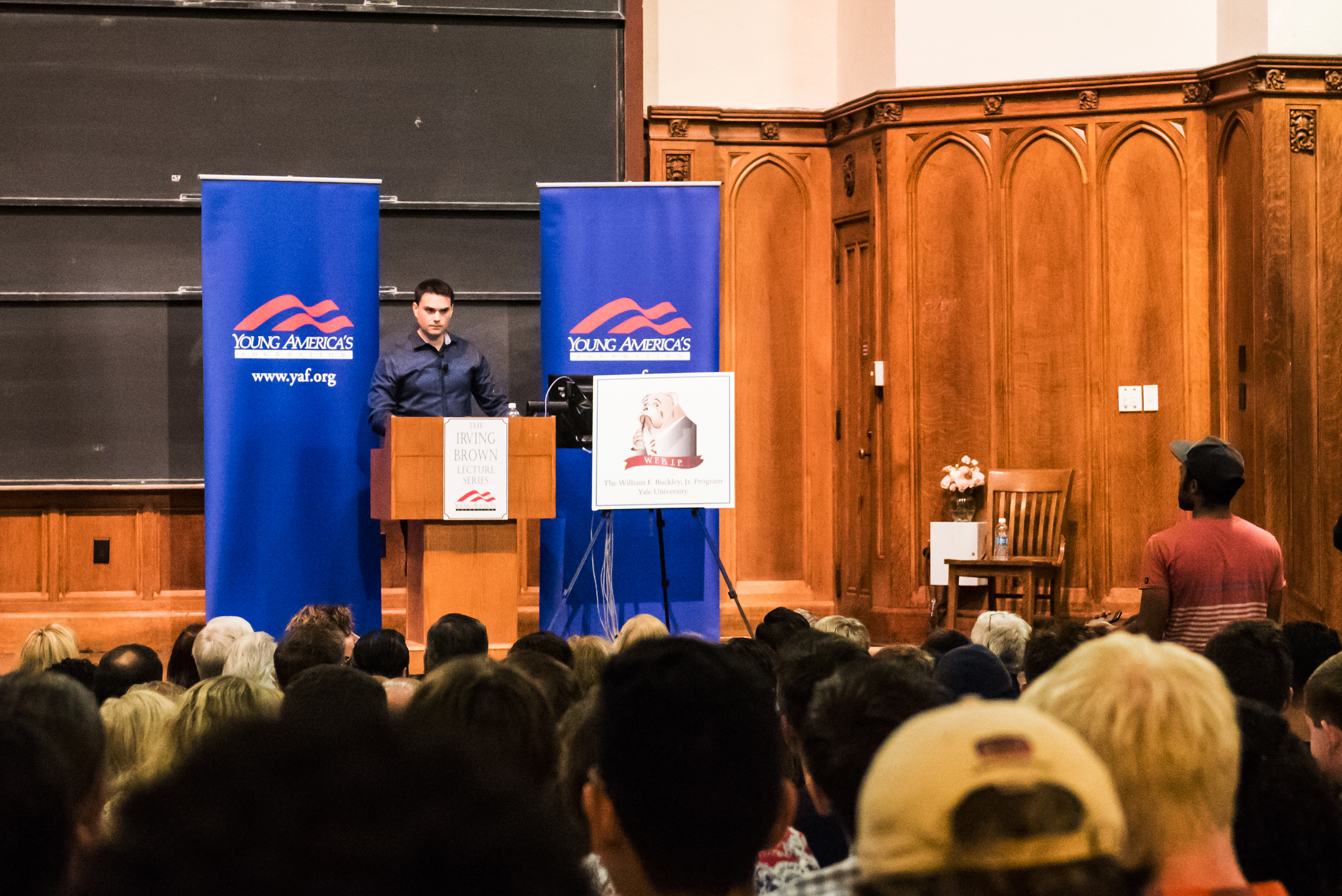
Conservative political commentator Benjamin Shapiro arrived to a full house in the Sheffield-Sterling-Strathcona auditorium Wednesday evening to much anticipation, but also much anxiety.
Shapiro, who was speaking on “White Privilege, Multiculturalism and Other Leftist Myths” at the invitation of the William F. Buckley Jr. Program, has been a controversial figure for his vocal, provocative opposition to ideas like microaggressions, affirmative action and safe spaces. He has been uninvited from speaking at university campuses due to student protests, and organizers worried his visit would elicit a similar reaction at Yale. But Shapiro’s speech -— in which he denounced narratives that he said prize equality of outcome over equality of opportunity -— ultimately proceeded smoothly, with students engaging charitably with his perspective.
“If the left doesn’t care about diversity of thought, what exactly do they mean by diversity?” Shapiro asked.
He opened his argument by criticizing the way he said current campus discourses threaten to stifle debate and induce violence. He said critical labels such as “racist” can be used to dismiss the viewpoint of someone with whom someone may disagree, rather than engaging it with facts. The very word “microaggression” implies that verbiage has escalated to the level of aggression and therefore violence, thereby validating aggression and violence in return, he said.
Shapiro also expressed disdain for specific events on college campuses over the past year, including at the University of Missouri and Yale. Shapiro argued that students at the University of Missouri demanded segregated safe spaces, to which he said a group like the Ku Klux Klan probably cheered with glee. Furthermore, he condemned Yale’s administration as weak for capitulating to demands for the abolition of the title “master,” arguing that the use of the word to refer to a head of college etymologically relates to having expertise and mastery of a craft – not to the title of slaveholders.
Still, Shapiro’s central theme was that the true solution to mainstream social issues lies in human decency. In addition to emphasizing the importance of equality of opportunity over equality of outcome — which he said is inevitably unequal — Shapiro strongly advocated for respect for others’ opinions and their individual rights. To solve the social problems that Black Lives Matter and policies such as affirmative action seek to address, he said, everyone should begin with basic human respect and end with a dedication to avoiding criminality, graduating high school and only raising families in two-parent homes -— solutions he said are substantiated by Brookings Institute research.
Shapiro’s remarks were met with both cheers and grimaces from the audience.
He took questions afterward from a student-dominated audience, who asked about the implications of unconscious bias for the existence of white privilege, the right of San Francisco 49ers quarterback Colin Kaepernick to protest and even the divisiveness of Shapiro’s own provocative language. Questions often evolved into a dialogue between the audience member and Shapiro, with a respectful tone and dialogue throughout. Although it was evident that Shapiro offended many members of the audience, none launched ad hominem arguments against him.
“Shapiro asked for people who disagreed to counter his points with why they did,” Buckley Program Vice President Kyle Tierney ’17 said. “Even if you didn’t agree with what he said, it was still a worthwhile experience, and I think even those students who completely disagreed with him gained valuable insight.”
Despite calling the “Left” fascist, racist and proponents of “repressive tolerance,” Shapiro said he believes liberals and leftists are fundamentally different. Anyone who believes that equality of outcome outweighs equality of opportunity is on the Left, he said; liberals are separate and do not hold that belief. Shapiro received hisses for his definition of the Left but maintained that everyone was free to define the ideology differently.
“The questions were great, students challenged him on his points and they launched a discussion on different ideals. And that is what we look for,” Buckley President Joshua Altman ’17 said. “There is something inherently valuable in diversity and intellectual diversity especially. In regards to how students charitably engaged and listened to what he had to say and offered their own views and had a discussion about them … That I think is the hallmark of a Yale education.”
Medical school professor David Leffell ’77 said he noticed a marked difference between the audience’s reception of Shapiro, and the climate of campus protests last fall.
“It was important to hear all perspectives, and Yale students impressed me with their patience to listen to opinions they might otherwise object to,” he said.
The William F. Buckley Jr. Program at Yale was founded in 2010 by a group of Yale undergraduates to promote intellectual diversity on campus.







